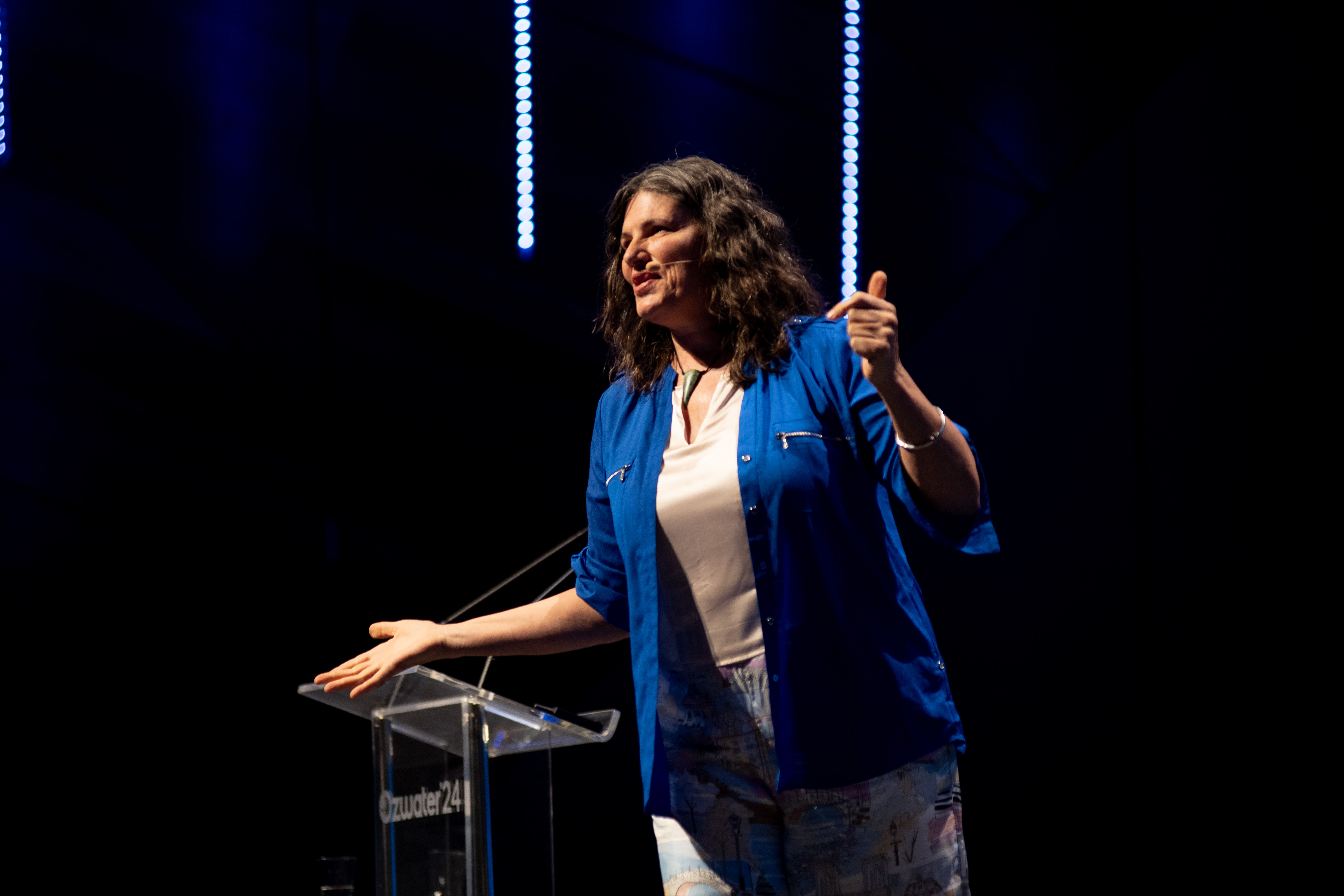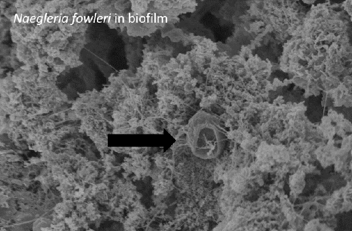Working with nature to thrive, not just survive

Connection, resilience and hope were top of the agenda at the Ozwater’24 opening ceremony, with Gina Chick – the 2023 winner of Alone Australia – sharing the key to her survival within the Tasmanian wilderness for 67 days alone.
“10 Australians of dubious sanity get dropped into a winter wilderness to survive as long as possible with 10 basic survival items and 70 kilos of camera gear,” Chick said, describing the premise of the SBS reality television series.
“The only way you can leave is if you press a red button, which is for when you have injured yourself to the point of putting your life in danger. And you just hope that they make it in time.
“You can also get tapped out by a medic. Or someone you love can jump out from behind a bush and say: “Surprise! You're the last person standing”. And that's what happened to me.”
The second woman and oldest contestant in the history of the Alone worldwide to win, Chick shared with Ozwater’24 delegates the secret to her success.
“The interesting thing isn’t winning, it is how I won,” she said.
“Survival is often shown as ‘man versus wild’. There is this sense of needing to dominate nature, micromanage nature, or to solve nature. But nature is not a problem to be solved and I didn’t do any of that.
“I jumped around barefoot. I had a great time and made friends with a platypus. I caught dozens of fish. I thrived out there. I was at home in the wild.”
There are four key elements to embracing nature, working with the wild and thriving through adversity, Chick said, all relevant to the challenges faced by the water community today.
“The first is a really deep and profound nature connection. The second one is an understanding of resilience. The third is a bone-deep sense of hope,” she said.
“And the fourth one is the ability to let go of everything that we think we know and allow what's in front of us to teach us a new way to be.”
Real connection
Reflecting on her time spent in the Tasmanian wilderness, Chick described “dying, dissolving” and “regrowing as a patch of land three kilometeres wide” – an experience that points to the fundamental need to connect with the environment to survive.
“Whenever I needed anything, I would ask. I knew I was part of an interconnected web of life where I was no more important than any bird or bee or tree or fish. But I was also no less important, either,” she said.
“And whenever I needed anything, every strand on that web pulled on every other strand by being in deep receptivity. By listening and by asking, I would get my needs met. I was in a deep relationship. I was collaborating with nature. I was co-creating with nature.
An understanding of and dedication to this interconnectivity is what is necessary to solve the problems that we face in our world, Chick said, including climate, overpopulation and environmental destruction.
“The ‘man versus wild’ paradigm, it just doesn't work anymore,” she said.
Aside from connection to nature, Chick said resilience and hope are not to be underestimated.
“Resilience is our ability to save ourselves. Resilience is our ability to solve challenges. And for us to be able to do that, we need to be able to be uncomfortable. We need to be able to sit in discomfort,” she said.
“Water people are all on the front line. You're on the front line of change. And it can be hard to keep going if we don't have a sense of hope. There's a lot of doom and gloom out there. It can be pretty grim. And so our hope is our faith in our ability to save ourselves and for us to do it together.”
What we don’t know
Most importantly, letting go of the idea that we know the answer is crucial to finding new ways forward together with the natural environment, Chick said.
“Our culture is big on saying: ‘I know this, I know that’. But as soon as we say ‘I know’, we collapse reality down to one point, one possibility,” Chick said.
“Part of our meaning-making machine is to categorise our world so that we can predict things. For us to feel safe, we want to be able to predict the behaviour of everything around us.”
Using a tree as an example, Gina said every time we think we see a tree, we see a representation of what we think a tree is, but not the reality of the tree itself.
“Every time we see a tree, we label it a tree. And it becomes codified. It becomes almost like a cardboard cut out of a tree. We collapse reality down to one fixed point. We don't see the tree. We see what it means in our minds,” she said.
“When we say ‘I don't know’, we are using the language of wonder, of infinite possibility. As soon as I say ‘I don't know’, everything is possible. It's the language of intuition. It's the language of solutions.
“When we don’t think of a tree as a noun, the tree can become many things.
“It’s a resting place for birds. It’s a catcher of wind. We could call it somewhere to lean. We could call it a place to have shade. We could call it somewhere where lovers kiss. We could call it a transport system for water.
“And we would never run out of ways to describe the tree because a tree is infinitely variable. And as soon as we say, ‘I know what a tree is’, we're wrong because we can never fully know anything. No matter how deep we drill, there's always more to learn.”
Like all living things, a tree is not an object, but a process.
“A tree isn't a thing. It's not an object. It's actually a process. It's constantly changing. It's constantly evolving. We could even say a tree is not a tree, it's actually treeing,” Chick said.
“And if we say that a tree is treeing, we are in relationship with it. Now we are seeing it not as a static object, but as a dynamic ever-changing series of processes. Now we are part of the conversation. It isn't a monologue, it's conversation.
“If we are going to make decisions about the incredible processes of life, including streams and rivers and rain and water, first we need to see them.
“We need to see them as they are – as processes rather than things. We need to see their relationships. When we do that, and we become part of the conversation, we have the ability to have nature teach us the solutions we need to survive.”

